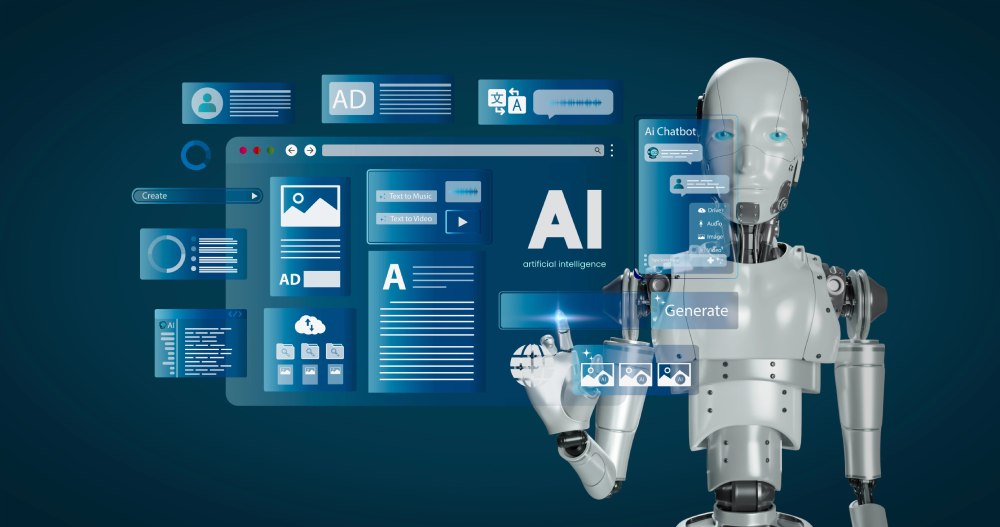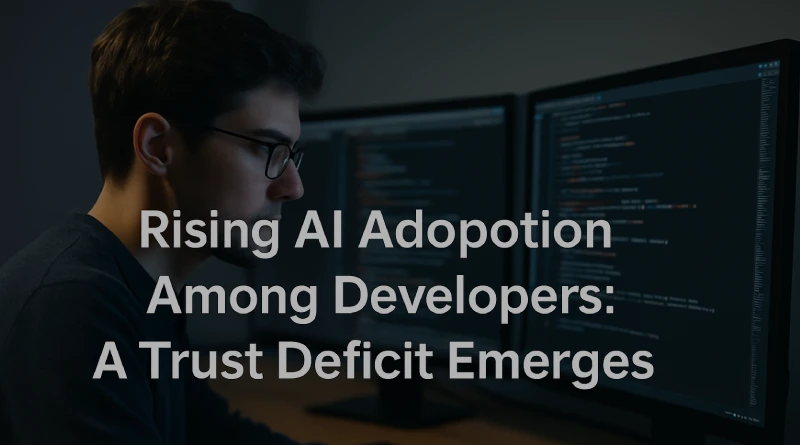Rising AI Adoption Among Developers: A Trust Deficit Emerges
Artificial intelligence AI is also a new force transforming the software development industry, and its application has skyrocketed among developers all over the globe. But an increasing loss of trust is about to weaken its potential. The 2025 Global Stack Overflow Developer Survey, with more than 49,000 professionals in 177 countries, shows that use of AI tools by developers has risen to 84 per cent, with 12 per cent more responding that they intend to use them in future, compared to 2024. Still, just one-third believe in the quality of the results produced by AI, and this number has dropped significantly compared to the previous year (it was 43 percent). Together with the results of a worldwide survey by Melbourne Business School and KPMG that revealed that only 46 % of the population trusts AI even though 66 out of 100 people use it regularly, the trend poses important questions to India where the burgeoning tech sector is worth an estimated 200 billion dollars (NASSCOM, 2025) and employs a significantly large number of 1.5 million AI specialists (AICTE, 2024).
The Surge in AI Adoption
The Stack Overflow survey underlines the build-into-development processes of AI by using programs such as GitHub Copilot and ChatGPT that save time by automating tasks. Time (70 percent) and productivity (69 percent) advantages are reported by developers especially in debugging and code generation. Such adoption is rising fast in India, where 40 percent of AI startups are based in Bengaluru (Tracxn, 2024), and which has a young workforce 300,000 computer science graduates annually (AICTE, 2024), and mobile user base of 900 million (Statista, 2025). The KPMG report documents that 58 percent of workers around the world use AI on a weekly basis, and 48 percent of them attributed it to the growth in revenue, which is also reflected in India, where the IT industry is the workplace of 5.4 million (IBEF, 2024).
The Trust Dilemma
As beneficial as it is, there is languishing in the trust area. In 2024, the approval rating of AI on Stack Overflow measured 72 percent and declined to 60 percent one year later, because authors grew frustrated with erroneous results and the time consuming aspect of a debugging process. CEO of the company, Prashanth Chandrasekar of Stack Overflow, highlighted the issue of the risks of misinformation as of concern. Limewired to the KPMG research, 58 percent of surveyed users worldwide no longer trust AI, a score that has increased since before 2022 by pointing to such AI foibles as false outcomes (56 percent confess having encountered AI-related errors), complacency (66 percent fail to do a checking routine). Localized miscalculations in India add to the distrust since 60 percent of AI models in India are reflective of a Western bias (NASSCOM, 2024).

Unique Insights: A Paradigm Shift
This lack of trust shows that there is a paradox about AI, automation is its strength however safety depends on how it is monitored by humans. Programmers are becoming not only coders but validators, which implies having new professional skills such as being able to design the timely release of products or performing quality control procedures. Such a change can unlock the potential of rural talents in India, of which 30 percent do not have access to the internet (NITI Aayog, 2024). However, this requires establishing trust by conducting open verification mechanisms. Discussions such as the X suggestion by @TechIndia to run “AI literacy campaigns” show a groundswell in favour of education, but a candid concern as to job security exists, as @DevTrust points out.
Local Context: India’s AI Journey
The technology ecosystem in India is in a dilemma. The startups of Bengaluru are in a rush to adopt AI, which has already garnered > 1.2 billion in 2024 (Tracxn), but since not everyone embraces the idea, similar to the rest of the world, most people do not believe in it. KPMG study indicates that the trust is stronger in the case of emerging economies (60-40 against the advanced) which probably relates to the economic upliftment through AI that is pertinent in the case of 70 percent tech imports in India (MeitY, 2024). Nevertheless, per KPMG, 64 percent of Indians are concerned about having AI affect elections, which also coincides with global concerns about misinformation which is a critical issue prior to 2026 elections.
Risks and Ethical Concerns
The misuse of AI is becoming a matter of concern. According to the KPMG study, almost a half of employees are found to be uploading sensitive information to public platforms by simply bypassing company policies, which is a greater risk in the sectors such as fintech in India. Laziness- 66 % by using the results that have not been proved to be correct can prove very expensive errors when implemented in delicate areas such as healthcare, where 20 % of AI-related failures come (WHO, 2024). Ethics in governance has become very important with 70 percent of the international respondents including Indians insisting on regulation and only 43 percent believing the existing laws are adequate.
Building Trust: Strategies for Developers
- Verification Protocols: Always cross-check AI outputs with manual reviews, especially for critical code.
- Skill Upgradation: Enroll in AI-focused courses (e.g., Coursera’s AI for Developers) to master tool integration.
- Policy Compliance: Adhere to data security norms, avoiding public platforms for sensitive work.
- Feedback Loops: Report inaccuracies to tool providers like Stack Overflow to improve reliability.
Industry Response and Future Outlook
Organisations are becoming active. One way of quantifying trust is the KPMG Trusted AI which aspires to close ethical gaps that India AI governance framework 2026 (MeitY) also aims at. This change might be spearheaded by developers who evolve, using system design and AI orchestration, but others remain tenacious, and risk becoming obsolete as GitHub CEO Thomas Dohmke cautioned. This transition is proposed to be somewhere between 2-5 years according to the Stack Overflow survey, in the interests of proactive upskilling.
Conclusion
Adoption of AI is sky-rocketing amongst developers, but trust is the roadblock. To India, this poses a chance to be on the forefront in AI innovation, but still solve local problems such as infrastructure and bias. The tech community can help eliminate this gap by promoting education, policing ethics, and promotion of more oversight to give the promise of AI to benefits everyone. There is a need to ensure that trust stays at pace with the expansion of adoption to maximize that potential.
Disclaimer
The information presented in this blog is derived from publicly available sources for general use, including any cited references. While we strive to mention credible sources whenever possible, Web Techneeq – Website Developer in Mumbai does not guarantee the accuracy of the information provided in any way. This article is intended solely for general informational purposes. It should be understood that it does not constitute legal advice and does not aim to serve as such. If any individual(s) make decisions based on the information in this article without verifying the facts, we explicitly reject any liability that may arise as a result. We recommend that readers seek separate guidance regarding any specific information provided here.

